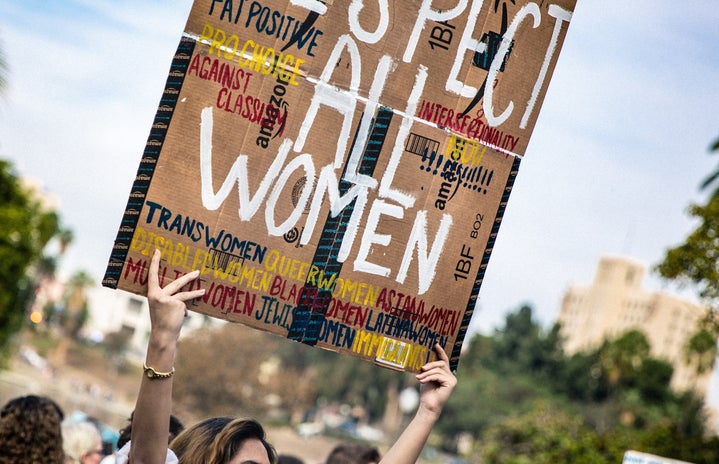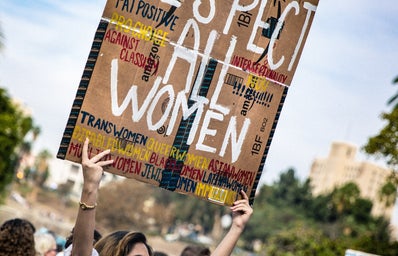Weight, in itself, is not an indication of disease or should be used as a tool to justify social issues, but why does society continue to make these associations? Here are some changes we can make to speak up against fatphobia.
- The political body
-
Combined with sexism, fatphobia affects fat women even more fiercely. It’s a cruel social mechanism that aims to generate a feeling of inferiority through the imposition of a corporeal that, sometimes, is a fanciful standard.
This intersectionality of oppression between being a woman and being fat makes us come to the conclusion that the personal is political, since it’s essential to try to understand why this body is not accepted in the hegemony of thought. Everything that escapes this classic structuring of the naturalized aesthetic standart is sidelined, stereotyped and made invisible.
Thinking about the constant debates about the reframing of the female figure nowadays, the digital influencer Mari Lima says that ”we still have a lot to go on, we have a lot of the culture of beauty rooted in our experience, the girls still look in the mirror, think they are fat and see it as a negative charge. They give a lot of value to the scale number, the label, why are the numbers so important? We are not just a body, we are far beyond our external part”.
The cult of unreal beauty is encouraged by patriarchy and acts as a mechanism for social control, in order to prevent women from being empowered and free. And it, along with the cultural industry and capitalism, produces a thorny scheme of domination that works with very subtle nuances at times. For example, declaring the lack of sexual or romantic interest in a fat woman is one of the multifacets of fatophobia, so we cannot sum this point up to a simple “matter of taste”. If taste is such a subjective thought object, why do so much people think the same?
The whole architecture of this system makes the person project the desire to be a pattern and feel attracted – only – by that standard.
The exalted, praised and deified body by society is still the thin body. The culture of thinness exists to foster the oppression of fat bodies.
- Medical fatphobia and its consequences: physical and psychological
-
Every other day, prejudice appears disguised as concern. Fat women always have in their social coexistence the ‘‘good fitness inspectors’’. This group insists on reproducing the discourse that being thin is synonymous with being healthy.
The nutritional cacophony in which we are inserted promotes the internalization of the eternal hunt by the ‘perfect’ body, whatever it costs. The consequences of that? Body image paranoia, eating disorders and fat panic.
Another essential factor in the social narrative of the fat woman is guilt, since, according to people’s fables, the only culprit for not fitting into the body standard is you, being responsible for everything you eat – or stop eating for aesthetic approval. Today, we know that’s not true, overweight and obesity can be due to genetics, lack of sleep, hormonal imbalance, or even stress.
Laconically, making comments about other people’s bodies doesn’t help anything. In fact it only damages the emotional state of the individual. We need to talk about how the imposition of the culture of thinness affects the biopsychosocial zeal of fat women.
Regarding medical fatophobia, – a factor that makes up an important nuance of the deep-seated repudiation towards fat people – the clinical psychologist and creator of the project ”What are you hungry for?”, Vanessa Tomasini says: ”we have a very high number of fat people who avoid the hospital environment, basic health care, because they often know that this professional is unlikely to be empathetic and that every doctor’s appointment will revolve around this person’s weight, lack of willpower to lose weight.” She also adds that “there is a dehumanization of these fat bodies. Some health professionals are fighting against people and not favoring access to health and care that every human being needs and deserves to receive with empathy, kindness, ethics and professionalism.”
- Representativeness: It’s past time to praise Body Positive!
-
It’s commonplace how much the media has contributed – and still does – to the maintenance of fatphobia, in terms of representativeness, we are still in its infancy.
What are your references? Are the cultural products you consume inclusive? Media products tend to represent the pattern because this group is standardized, and in many cases when fat people are presented in the media they tend to function simply as an archetype and not as a subject full of potential and experience.
However, with the 21st century we have seen the awakening of demands that seek greater diversity of characters in the narratives, so that some precious examples can be raised and celebrated.
“There is nothing more powerful than a fat girl who doesn’t give a fuck’’
If there is one thing that the Euphoria series knows is how to create a stir, the production does not spare explicit scenes from the most diverse (and necessary) guidelines, which are still taboo. In the middle of it all, we have the character Kat. Funny, bold and captivating, she is, above all, a power that marks the times in which we live.
“Every body is a swin suit body”
Genuine, talented and revolutionary. Willowdean, protagonist of the film “Dumplin” presents us with a sure path of empowerment that shows that it’s possible to go against the expectations created by constant body shaming.
Another movie that focus on this subject is “Stars By The Pound”. Watching it we learn about sorority and how to fight against established impediments with Lois , who is brilliant, curious and funny. But she is fat. And this characteristic seems to define all the directions of her life. Relationships, family, the dream of being an astronaut, her connection with the world works from this perspective. In the fat body, the character endures, with resignation, the insults and annoyances imposed socially for being who she is.
“Fat (adjective) a descriptive word it has no deeper meaning it should not determine the worth (or lack thereof) of a human being” – what i know now that i wish i knew then
Leah is strong, acid, intelligent and artistic – no wonder she is from Slytherin – In the literary work “Leah on the offbeat” we enter a very particular universe of a young woman who hates many things, who sometimes feels lost , but always determined to find herself.
Amanda Lovelace’s writing talks to the reader, her trilogy easily makes us feel welcomed, particularly if you have experienced the same things as the author. It’s as if with the poetry collective we heard the phrase: ‘’I already had the same uncertainties, the same fears and the same joys’’.
The stories of these women, unlike other productions, no longer make up a successful narrative about weight loss and how it corroborates the formation of self-esteem. They are narratives about fat women who find themselves happy – and beautiful – like that.
As long as body aesthetics still serve as a divider in order to demonstrate what form of existence is legitimized, we need, in the individual and in the collective, to seek ways out to build a healthier social body. One of the solutions for this was presented by the digital influencer Mari Lima. “I’m hoping that children will see us struggling to change the standards of beauty and will continue on the same journey. I have a stand-by project of non-fatophobic creation, of not charging aesthetic standards to children, for example. Break the standards so that the next generation is happier so that they have less of this issue to deal with”. Let’s go together!


